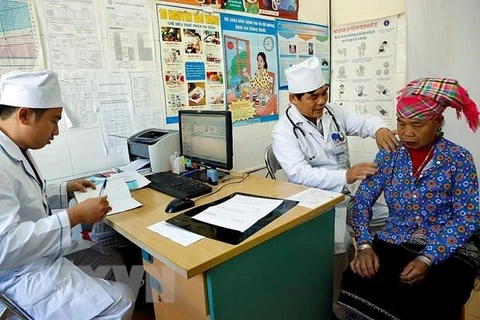 Vietnam’s growth momentum moderated since the beginning of the year, but outlook remains positive, according to Taking Stock, the World Bank (WB)’s bi-annual economic report on Vietnam released on July 1. (Source: VNA)
Vietnam’s growth momentum moderated since the beginning of the year, but outlook remains positive, according to Taking Stock, the World Bank (WB)’s bi-annual economic report on Vietnam released on July 1. (Source: VNA) Hanoi (VNA) - Vietnam’s growth momentum moderated since the beginning of the year, but outlook remains positive, according to Taking Stock, the World Bank (WB)’s bi-annual economic report on Vietnam released on July 1.
During the reported period, the service sector performed robustly – signaling sustained buoyancy in domestic demand and especially private consumption.
The public debt-to-GDP ratio declined from a peak of 63.7 percent in 2016 to an estimated 58.4 in 2018.
Recent slower growth reflected the repercussions of unfavorable external factors on key economic sectors.
The outbreak of African swine fever and a decline in international prices dampened agricultural outputs while weaker external demand moderated growth of the export-oriented manufacturing sector.
Despite these signs of a cyclical moderation in growth, Vietnam’s outlook remains positive, the report says.
Real GDP growth for the whole year of 2019 is forecast to decelerate to 6.6 percent, driven by a weaker external demand and continued tightening of credit and fiscal policies. Inflation indexes are meant to be kept below the official inflation target of 4 percent.
Ousmane Dione, the World Bank Country Director for Vietnam, said risks have continued to intensify, reflecting heightened global uncertainty amid re-escalation of trade tensions and rising financial volatility.
Those external risks are compounded by domestic vulnerabilities, including potential slippages in fiscal consolidation, Stated-owned enterprises and banking sector reforms could undermine investor sentiment and growth prospects.
“Vietnam needs to prepare to adjust macroeconomic policies in case some of these risks materialise and lead to a deeper than expected downturn,” said Ousmane Dione.
He said Vietnam will also continue to push for deeper structural reforms, enhance export competitiveness and further deepen trade integration through bilateral and regional agreements.
According to the report, the tourism industry contributed 8 percent of GDP in 2017. It surmises that the sector’s rapid expansion has brought it to a tipping point in its development, where continued growth, if not well managed, could have adverse economic, environmental, and social impacts.
The report suggests certain measures to ensure the long-term sustainability of the sector.
Key priorities include enhancing coordination of destination planning and product development, diversifying tourism products and visitor source markets, developing tourism workforce skills, strengthening local tourism value chain linkages, improving visitor flow management, boosting destination infrastructure capacity and quality, and protecting environmental and cultural assets.-VNA
VNA























